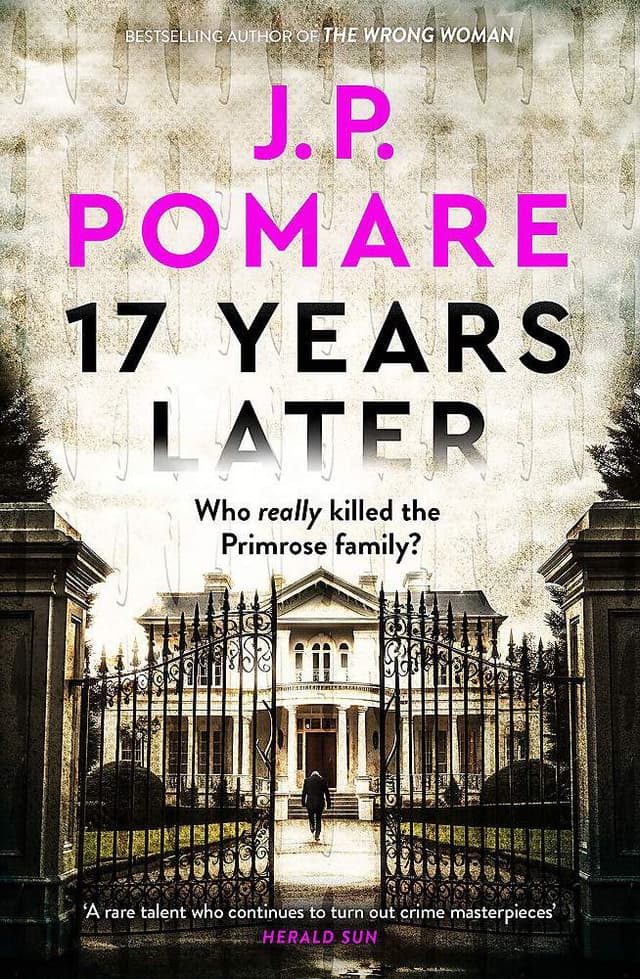Review: 17 Years Later, by JP Pomare
Reviewed by Greg Fleming
J.P. Pomare has fast become our king of the thriller twist - an innately gifted writer who has proven through six previous novels the ability to upend even a canny reader’s expectations in the final chapters. If you think you’ve figured out who did it in a Pomare novel, well sorry, but you’re probably wrong. That continues here in a whirlwind finale of another deftly crafted thriller; even better, this novel sees Pomare stretching himself - taking on subjects that seem more personal than previous outings - racism, colonialism, and the vagaries of our justice system.
I read this soon after the excellent Return to Blood by another superb Māori crime writer, Michael Bennett, which explores similar themes. Pomare includes a quote from the crown’s apology in the Teina Pora case as an epigraph – “ …mistakes are possible in any system that relies on human judgement” – along with a quote by Amanda Knox.
Indeed, this is a bit of a homecoming for the Bay of Plenty writer. Most of it is set in Cambridge (which protagonist Bill Kareama describes as one “more known for hobbits and breeding racehorses than the bustle of city life”) where a wealthy English family, the Primroses, has settled after being banished from their London home.
Then one night three of the family are brutally murdered, and only their teenage daughter survives. Kareama – a young, talented chef who had been hired by the family - is quickly arrested after witnesses see him running from the house (“He was Māori” – a neighbour states in a transcript in the opening pages). Kareama is quickly convicted.
Fast forward seventeen years and the case comes to the attention of Australian true crime podcast queen, Sloane Abbott, who has come under criticism on social media for only covering cases involving privileged white people like herself. The Kareama case is the perfect pivot and she’s soon booked into a dingy “sponge-coloured” Cambridge motel hunting down contacts. Another key character is Kareama’s prison psychologist TK who quit his job to help free his patient but is now questioning his innocence.
Pomare, who has run a popular podcast on writing and knows the genre well, is brilliant on both celebrating the power of the platform while also focusing on the nuts and bolts of which cases get coverage in a genre that knows “white crime” brings in the listeners. The story is told through first person accounts from each character, with a timeline veering effortlessly from “present day” efforts by Sloane and TK to the months preceding the murders. This gives Pomare ample opportunity to highlight the unrelenting, if covert, racism which has been bred into the elder Primroses.
The tour-de-force here is a scene where Kareama is cooking for a dinner party at the Primrose home which is attended by various visiting British dignitaries. He is asked to come out from the kitchen and tell the gathering about his life in New Zealand.
‘“Now, Bill is a Māori.” The way she bleats it like a sheep - Mah-ree…
“He could almost be Portuguese or Spanish.” The wife of waistcoat man spoke this time. I was a bug pinned under a microscope, wings impotently flapping.'
Pomare also finds time for a bit of fun – the only book in Bill’s possession is one by our own queen of crime Ngaio Marsh, and another character is reading Australian crime writer Michael Robotham and Scottish writer Val McDermid – both companions of Pomare on a recent book tour.
17 Years Later is a novel that delves deep into issues of justice, our colonial legacy and race without ever seeming heavy handed – it’s a superb up-all-night thriller and is Pomare’s most deeply felt novel yet. Highly recommended.
Reviewed by Greg Fleming
